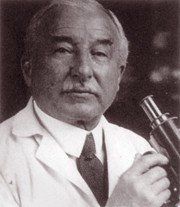
“[…] for his research on cancer. The research, which was conducted based on a rigorous scientific methodology, resulted in observations that were crucial to medicine and surgery.”
A. sah die zentrale Aufgabe der Pathologie in der Systematisierung der Krankheitsursachen (Ätiologie). Damit habe er laut den Gutachtern die in seinem Fach vorherrschende Beschränkung auf die Morphologie durchbrochen und insbesondere die Karzinomforschung entscheidend vorangetrieben. Weiter habe er die ‘Entweder-Oder-Fragestellung’ in der Krankheitslehre mit seiner polyaetiologischen Denkweise überwunden: A.s ‘4 Faktor-Theorie der Geschwulstgenese’ führt die Entstehung eines Karzinoms zurück auf das Zusammenwirken von allgemeiner Disposition (z.B. Vererbung), örtlicher Disposition (geographische Pathologie), exogener Reize (z.B. Parasiten) und endogener Reize (intrazellulär).

